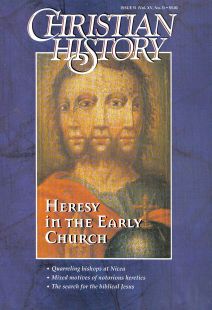The king visits earth
WHAT WAS GOD TO DO in face of the dehumanizing of humankind, this universal hiding of the knowledge of himself by the wiles of evil spirits? What else could he possibly do but renew his image in humankind, so that through it people might once more come to know him? And how could this be done save by the coming of the very image himself, our Savior Jesus Christ? Human beings could not have done it, for they are only made after the image; nor could angels have done it, for they are not the images of God. The Word of God came in his own person, because it was he alone, the image of the Father, who could recreate human beings made after the image.
At one and the same time—this is the wonder—as man, he was living a human life; and as Word, he was sustaining the life of the universe; and as Son, he was in constant union with the Father.
The solidarity of humankind is such that, by virtue of the Word’s indwelling in a single human body, the corruption that goes with death has lost its power over all. You know how it is when some great king enters a large city and dwells in one of its houses. Because of his dwelling in that single house, the whole city is honored, and enemies and robbers cease to molest it. Even so is it with the King of all; he has come into our country and dwelt in one body amidst the many, and in consequence, the designs of the enemy against humankind have been foiled, and the corruption of death, which formerly held them in its power, has simply ceased to be.
Some may ask, Why did he not manifest himself by means of other and nobler parts of creation such as sun or moon or stars or fire or air, instead of mere man? The answer is this: the Lord did not come to make a display. He came to heal and to teach suffering people. For one who wanted to make a display, the thing would have been just to appear and dazzle the beholders. But for him who came to heal and to teach, the way was not merely to dwell here but to put himself at the disposal of those who needed him.
—Athanasius
“On the Incarnation”
By Athanasius
[Christian History originally published this article in Christian History Issue #51 in 1996]
Condensed and modernized from “St. Athanasius on the Incarnation,” translated and edited by a religious of C.S.M.V. (St. Vladimir’s, 1944).Next articles
Heresy in the Early Church: Recommended Resources
More resources for further information on heresy in the early church.
David WrightChristian History Infographic — Sifting Through the Christ Controversies
A quick summary of the competing schools of thought.
the EditorsThe Defining Moment
Key portions of the church’s most important theological statement.
J. Stevenson and Peter L’HuillierWhy Bishops Should Be Trusted
When some early Christians said they had secret apostolic teaching, one church father said, “Not likely.”
Irenaus of LyonSupport us
Christian History Institute (CHI) is a non-profit Pennsylvania corporation founded in 1982. Your donations support the continuation of this ministry
Donate



